Microbiotalk: short conferences on antimicrobial resistance
Breaking the silence: a global conversation on antimicrobial resistance
Antimicrobial resistance (AMR) is a silent pandemic threatening decades of medical progress. This Microbiotalk conference aims to illuminate the multifaceted challenges of AMR, exploring the intricate connections between gut microbiota, environmental factors, and public health. Featuring international experts and patient advocates, the event delves into topics such as the impact of antibiotics on the intestinal microbiota, the emergence of resistance in early childhood, environmental reservoirs of resistant bacteria, and the critical role of patient and public engagement.
By fostering open dialogue and sharing cutting-edge research, this conference empowers healthcare professionals, policymakers, and individuals to take informed action against one of the most pressing health threats of our time.
- Learn all about microbiota
- Microbiota and related conditions
- Act on your microbiota
- Publications
- About the Institute
Healthcare professionals section
Find here your dedicated section
Sources
This article is based on scientific information
Sections

About this article
Launched during the WAAW 2024 campaign, this conference series offers a unique opportunity to deepen your understanding of microbiota as well as exploring major public health challenges, such as antimicrobial resistance, digestive diseases, the resistome, the importance of the first 1,000 days of life, women’s health, and more.
Check out the content of the very first Microbiotalk here on Antimicrobial Resistance.

Vanessa Carter
Patient and public involvement is key in tackling AMR
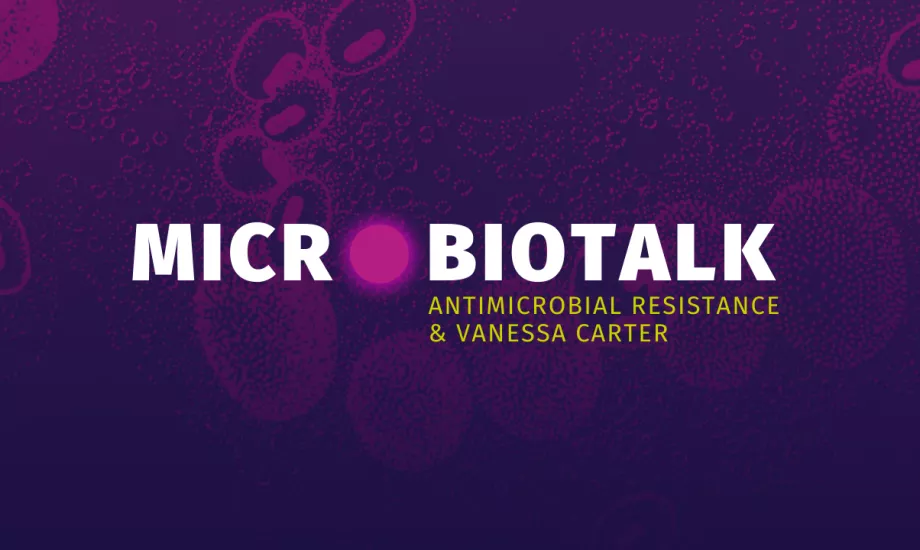
"Antibiotic resistance isn’t discussed enough with patients, and many don’t understand the basics. By teaching people about the proper use of antibiotics we can empower them to be part of the solution"
Chair of the WHO Taskforce of AMR Survivors. She became an AMR patient advocate in 2013 after surviving a serious car accident and 10-year facial reconstruction that caused a highly-resistant MRSA infection which she fought for 3 years.
So this was what I call my...or what was my last photo that was taken at the age of 25. On the right-hand side is my mother, our three generations photo, my grandmother and myself.
Very shortly after that,I ended up in a car accident in Johannesburg, South Africa. A car overtook us on the wrong side of the road. We went into a violent spin, and we hit into a concrete wall.
I was resuscitated at the scene and I was taken to the Charlotte Maxeke Johannesburg Academic Hospital,where I was put on life support,and I had multiple injuries to my abdomen, to my neck, to my back, and also to my pelvis, and a lot of broken bones on the right side of my face, and I also lost the right eye. So once I was discharged, I faced a nine-year journey ahead of me to reconstruct my face because it was a very complicated area and had a lot of damage to it. So this is basically a snapshot of what my journey looked like. So I had to implant a lot of prosthetics.
On my fourth prosthetic, that needed to be implanted about six years down the line, after being discharged from surgery, I went out shopping. I pulled down the rear-view mirror and I saw this discharge just coming out of my face. I got such a fright, I ended up phoning my plastic surgeon and he said: “this sounds like this could be an infection. We need to do an emergency surgery “, which we did. I got discharged.
Two weeks later, the infection was back again. They did a very similar surgery. They had to clean the prosthetic, and they had to do reconstructive surgery. I got discharged. But two weeks later, the infection came back again, looking worse. I was then admitted for a sinus drainage, because I wasn't just under the care of a plastic surgeon, I had a multidisciplinary team. I had to also consult with the ENT surgeon, with the maxillofacial surgeon, with the plastic surgeon, with an ophthalmologist. Each of them was giving differing opinions and prescribing antibiotics in between me seeing them all. And of course, as I said, I had those ongoing surgeries with the infection reappearing two weeks each time. So eventually, I hardly had a face left.
Eleven months from the first time that I saw that infection, and having that infection come back four times, it had eaten a lot of the tissue away, and they had to remove the prosthetic in emergency. And my plastic surgeon sent it for tests. This was the first time that I heard that word 'test'. So I phoned the pathology offices and I said, "Please, can I see a copy of it understand what's going on?" And when they sent it through to me, there were a lot of R's, there were about four or five S's, meaning I was... I'm sure most of you are working in microbiology, you know.
It meant I was either resistant or susceptible to the different antibiotics that were on the left-hand side. And I had a highly drug-resistant MRSA, a methicillin-resistant Staphylococcus aureus infection. My doctors had now given up on me, because this was just maybe too much damaged effects. Plus, I also had the problem of the infection, being a high-risk patient, with the infection coming back again.
I took my medical history. I must have contacted about 25 surgeons overseas, because in Johannesburg, in South Africa, we had a shortage of the type of doctor I needed. I connected with a doctor at Brigham and Women's Hospital in Boston, who gave me a 30-minute Skype call and direction of what I needed to do, which was basically to cut the bone, avoid any more foreign objects. We couldn't do plastic surgery. We had to do the maxillofacial surgery first. He said, now take that advice and go find a doctor in Johannesburg that mimics exactly what I said, which I did.
After visiting quite a few, I found a doctor. You can see him on the bottom right-hand side. His name was Professor Reyneke, and he performed the surgery, and it looked amazing. We couldn't believe that we had gotten rid of this deficit. It felt like it was worth all that hassle. Because it was basically a year from the time they took the prosthetic out to the time that we could get it fixed.
But like a bad case of déjà vu, the infection came back. This time not just in the skin, it was also in the bone. So I had osteomyelitis, and I had also developed an allergy to the topical antibacterial that they were using on the skin. At this point, you can imagine my heart sank, I completely lost hope, because I was not beating this resistant infection.
But Professor Reyneke basically started to rotate last-resort antibiotics. So he would have me on one for two weeks, for 10 days, I'd have to go back and he'd check it and he would put me on a different course depending on how I was responding to them.
And three months later, after doing that, it started to clear again. I then, probably about two weeks later, ended up in hospital with an adhesive bowel obstruction. My stomach, I think from all the use of those antibiotics,
I ended up having a section of my intestines removed. I also had adhesions problems, but of course, the antibiotics weren't helping the situation. After getting through that, this is kind of what the result was.
Again, nine years, just under 10 years of having to fight all of that. And of course, three years in total spent fighting resistant infections. When we were complete with that, and I haven't put all my slides in here, but one of the I got very frustrated about was because it was not common knowledge. Why was AMR, why was antibiotic resistance not being discussed with me as a patient?
I've done a lot of work since then. One of the things that I've done more recently is to establish a charity called the AMR Narrative, which focuses on advocacy capacity development and raising awareness, mainly focused on patients and the public. And of course, we work in the four different sectors, as my colleagues were just speaking about now, one health perspective.
This is an example of one of the training programs that we did in Brussels recently, in partnership with the European Patients Forum. We're actually teaching patients the basics of antibiotic resistance because those conversations are still not happening. This particular photo is of 30 young patient advocates with long-term health conditions that want to start advocating for AMR in their own regions. Here are a couple of snapshots, I've just come back from... I do a lot of events, but there's a few here that were taken at the United Nations General Assembly, which I'll talk a little bit about in the panel discussion in a minute, where I did the opening of the multi-stakeholder meeting together with the Deputy General of the United Nations and the President of the General Assembly. Very, very important is that political declaration that they've just worked on. I'll bring that up in a minute.
These are some of our tools and resources from the charity. If you go on to our website, you'll be able to see quite a few of them. We've also created a video for patients and the public to learn a little bit more in lay terms, because it is a very scientific topic. Our main aim is to make it understandable for everybody. And that would be it. This is how you would reach us on social media.
Thank you very much.
3 key messages
-
Struggle with a Resistant Infection: Vanessa Carter shared her personal experience of battling a methicillin-resistant Staphylococcus aureus (MRSA) infection, which required multiple surgeries and antibiotic treatments over a nine-year period after a car accident.
-
Importance of Awareness on Antibiotic Resistance: She emphasized the lack of communication and awareness about antibiotic resistance (AMR) with patients, which motivated her to establish a charity, the AMR Narrative, to educate and raise awareness among the public and patients on this crucial issue.
-
Multidisciplinary and International Collaboration: Vanessa highlighted the importance of collaboration among various medical specialists and seeking international advice to treat her complex infection, illustrating the need for a global and coordinated approach in managing resistant infections.
Download her presentation

Pr. Etienne Ruppé
The intestinal microbiota and antibiotic resistance
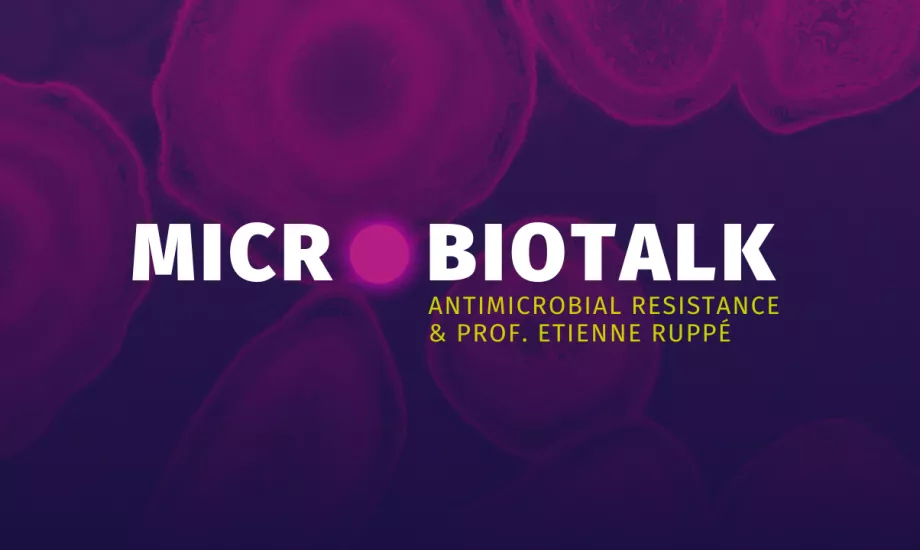
"HCPs must communicate antibiotic resistance clearly to patients, as misunderstandings persist. We should focus on the broader environment rather than blaming microbiota for resistance."
His research focuses on antibiotic resistance, on the interactions between microbiota and the emergence of resistant bacteria, the dynamics of antibiotic resistance genes (the resistome) and the diagnosis of infections, with particular emphasis on the application of new sequencing tools.
The intestinal microbiota and antibiotic resistance
Thank you very much for the invitation and this wonderful conference you're organizing today. The title of my talk is at the core of what you're proposing today, the intestinal microbiota being at the core of Antibiotic Resistance.
Let's start by a very simplistic representation of the intestinal microbiota and the resistant bacteria it can host. You know, I think, that the intestinal microbiota harbors a huge number of different microorganisms, the dominant one being the bacteria. We have hundreds of species that we estimate, and most of them are commensal, strict anaerobic bacteria that we culture with great difficulty in the lab, and most of them we don't culture at all. Then we got the opportunistic pathogens such as enterobacterales, enterococcus, and they are subdominant in the gut microbiota because of what we call the barrier effect or colonization resistance. This pressure exerted by anaerobic bacteria on this opportunistic pathogen, has a very important property, and we will see that when we take antibiotics, we just disrupt this equilibrium.
When we carry the resistant bacteria we're going to talk about today, then they are even subdominant in their opportunistic pathogens population. We're here today because antibiotic resistance is a major issue, and we have known now for a few years that it kills a lot of people in the world. We estimate the number of deaths being around a million per year. If we do nothing, if we do not react, there could be a total of around 40 million deaths over the next 30 years.
You see here on this graph the top killers. What I want to stress here is that mainly half of them are enterobacterales, acinetobacter baumannii, pseudomonas aeruginosa, half of them. I think most of the problem of antibiotic resistance lies in those bacteria nowadays.
Then you can see also the little circles with the colors. These are the pathogens for which WHO says that there's a critical high or medium need for new antibiotics.
Then we have this little poop emojis here, and they indicate that before causing infections, those bacteria lie in the gut. They will colonize the intestinal microbiota before causing infections. That is why the intestinal microbiota is really at the core of antibiotic resistance.
If we manage to control, understand what's going on in the intestinal microbiota, then we have leverage on fighting the resistant bacteria. Of course, this is a nice equilibrium, this barrier effect to colonization resistance.
But what if we take antibiotics?
Then we disrupt this equilibrium, we come from a diversified rich microbiota to something less diversified, less rich. Of course, not all antibiotics exert the same effect on the microbiota. It depends on how much they are excreted in the gut, how wide their spectrum is. And according to these variables, then you have a disruption of the microbiota.
If you are already carrying resistant bacteria, they will expand. They also favor implantation and colonization of new resistant bacteria. And this has consequences.
So again, what happens in your gut has external consequences. And we and others have shown that the more resistant bacteria you carry in the gut, then the more at risk you will be for infections caused by this resistant bacteria such as urinary-tract infections, bacterial translocation, especially in neutropenic patients.
You will spread more in the environment, and this is important. If you are in a healthcare structure, then this will promote cross-transmissions to other patients. You will carry it for a longer time, it's even connected to pneumonia. There's a connection between the gut to pneumonia in patients in intensive care, where pneumonia eventually gets colonized in the throat by resistant bacteria from your gut.
Those commensals that we had with anaerobic bacteria, are not devoid of antibiotic resistant genes (ARG). They are just different from the resistant genes carried by the pathogens.
So a few years ago, when I was at IAME, nearby Paris, we characterized this human resistance from the gut. And you will see that it's highly diversified with more than 6,000 resistant genes. We, all in this room, carry in average 1000 resistant genes in our gut. They have a very low identity with the resistant genes that we know from pathogens. They are mostly chromosomal. And with all that, all these arguments, we were starting to think that maybe they were not so bad, because it's really difficult for them to be transferred to pathogens. And I mean, we want our commensal bacteria to be resistant to antibiotics. So maybe antibiotic resistance is not so bad depending on the kind of bacteria they are.
This was my short presentation introducing some topics for today. What I wanted to stress is that the intestinal microbiota is mainly made of anaerobic bacteria where the opportunistic pathogens are subdominant. The majority of the bacteria which causes the biggest problem in terms of antibiotic resistance have an intestinal reservoir before causing infections. When we take antibiotics, we promote the expansion of this bacteria in the gut, and that leads to clinical consequences. We shall not forget our good bacteria, our good commensals. They have lots of resistant genes, and they're not largely transferred to bacterial pathogens.
So with that, thank you very much
3 key messages
-
Role of the Intestinal Microbiota in Antibiotic Resistance: The intestinal microbiota, which includes a vast array of microorganisms, plays a crucial role in harboring both commensal and opportunistic pathogenic bacteria. The balance within this microbiota is essential for preventing the overgrowth of resistant bacteria.
-
Impact of Antibiotics on Microbiota and Resistance: Antibiotic use disrupts the equilibrium of the gut microbiota, reducing its diversity and allowing resistant bacteria to thrive. This disruption can lead to increased risk of infections, environmental spread, and cross-transmission in healthcare settings.
-
Importance of Understanding and Preserving Commensal Bacteria: While commensal bacteria in the gut carry many antibiotic-resistant genes, these genes are not easily transferred to pathogens. Maintaining a healthy population of these commensal bacteria is vital, as they play a protective role and their resistance is generally not harmful.
Download his presentation

Pr. Søren Johannes Sørensen
Antibiotic resistance and infant gut microbiome
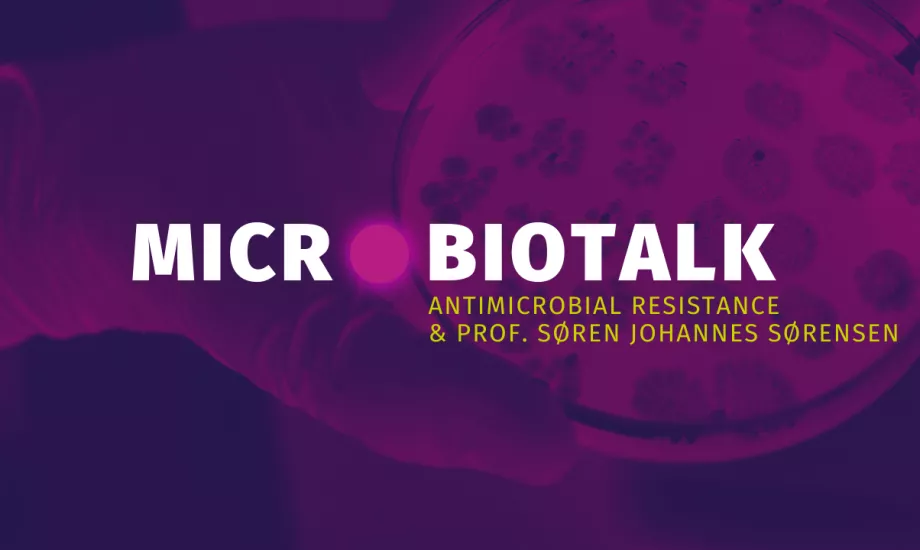
"Children treated frequently with antibiotics from an early age carry more antibiotic-resistant genes, especially E. coli, with resistance influenced by antibiotics taken by their mothers, affecting long-term health."
Linking the early life resistome and microbiome maturation. His research focuses on social interactions in microbial populations and evaluates the extent of genetic flow within natural communities and their response to environmental perturbations.
Antibiotic resistance and infant gut microbiome:
Thank you very much for that introduction, and for getting the opportunity to talk to you here today.
I think that we are taking up, actually, our research is following very much in line with what we just heard, because we have been studying a cohort of Danish children.
Actually not so much for the onset of this research for understanding antibiotic resistance, but we were interested in understanding how the microbiome early in life, actually shapes health later on, and specifically in this case, looking at asthma, allergy and those kinds of diseases.
We were already studying the microbiome in early life, and then we were seeing results coming out, that a lot of antibiotic resistance is actually in a reservoir in the gut microbiome of adults.
We were curious to ask, how early is this actually going to be established?
Is it something that we acquire late in life?
Or if we already look at these children?
We were actually following these children from birth. The data we were looking at was from when the children were 1-year-old, which is what I'm going to present.
The question we had was, is there already antibiotic resistance Danish children when they're one year old? And the sad, short answer is yes there is.
There's quite a lot already at that time. What we found, which was surprising to us, is in the bottom of the graph, you see that the distribution of the children and how many antibiotic resistance genes they have. So some children do not have many antibiotic resistant genes, whereas actually another population of the children have a lot. And not only they had many different types of antibiotic resistant genes, they also had them in higher abundance.
The children were divided into two groups. Therefore, we were curious to try to understand what is really determining in the child that early, whether they had a lot of antibiotic resistance or not so many. Since we have been following this cohort very, very carefully with lots of data, we could actually try to look into some of these things.
So the circle around there is kind of all these meta data we have, and one of them may be the cause. What we do find not so surprising is that if the children were subscribed with antibiotics for treatment, quite often in early life, for treating airway diseases for example, then they had a much higher risk of being in the group of children which had a lot of antibiotic resistance. There was a very clear connection there. What we also found was that if mothers during pregnancy, these children are now one year old, if they were taking antibiotics, then the child, one year later, was much more likely to have a lot of antibiotic resistance compared to not so many.
Even the mothers taking antibiotics during pregnancy seem to be very important for this. We were also finding other correlations which are maybe less evident. People living in an urban area have more risk of having antibiotic resistance compared to people living in a rural area.
If you have a pet in your house, you have less risk of having antibiotic resistance, so there are many factors. It's becoming more complicated, but we saw a very clear, not so surprising thing.
If you take antibiotics, then your child has a much higher risk. Actually, we see a lot of antibiotics are prescribed to children. However, if you then look at the right side, you see a diagram showing which antibiotics they are resistant to. The red ones are the antibiotics actually prescribed to either the mother or the child. But we see the two dominating ones, the ones that we find most resistance against, they were never prescribed, to neither the child nor the mother.
This is to show that these things are less simple to understand than we quite often see.
So we were trying to investigate this more. We thought one explanation for this could be that we have co-selection. What we know is often that antibiotic resistance is not sitting alone. It's actually in the genome together with other antibiotic resistance.
We started looking into whether we are seeing co-selection. That is what this graph is showing. It's very difficult for you probably to see here, but what we did find very clearly was that the two very abundant antibiotic resistance genes are co-located with the antibiotic resistance that they are treated with. What we are seeing here is that when we give one antibiotic, and it actually didn't matter which one, it caused a whole package of antibiotic resistant genes to come together.
When we were looking more at the co-selection here to see not only what antibiotic resistant were found together, but also why they were also together with other genes, what we found was that they were quite often with virulent genes. Actually, when you're selecting for antibiotic resistance with antibiotics, not only are the bacteria becoming antibiotic resistant, they are also actually becoming a worse pathogen. They're actually at the same time acquiring genes which are making them a more persistent and virulent pathogen. Finally, what we were seeing was that they were also co-located with mobile genes.
What bacteria can do, which is fantastic when you think about it, is they can exchange genes with each other. If a bacteria meets another bacteria and says, "oh, I like your eye color," then they can change it, and then they have the same color.
Of course, they don't have eyes, but they do have antibiotic resistant genes, so they can exchange a trait from one bacteria to another. And those are quite often, a mobile genetic element. And what we have shown very clearly here is that the antibiotic resistance is sitting in these children together in big packets on mobile genetic elements so that they can exchange it in the gut between one bacteria or another.
So even though maybe it's not a potentially pathogenic bacteria in the gut of the children, maybe if they get pathogenic bacteria, they can acquire them there. But not only that, I mean when we're thinking about the likelihood, and if it's an airway bacteria, maybe it's never getting into the gut. The thing is, though, that a gut bacteria is not always in the gut.
All of us, also children, are actually going to the toilet several times a day. So the gut bacteria are actually leaving the gut. They're flushed down the toilet. And that's actually an important phenomenon we also need to investigate.
3 key messages
-
Early Establishment of Antibiotic Resistance in Children: Research on Danish children shows that antibiotic resistance can be established as early as one year old. Children exposed to antibiotics early in life, or whose mothers took antibiotics during pregnancy, are more likely to carry a high number of antibiotic-resistant genes.
-
Factors Influencing Antibiotic Resistance: Various factors influence the presence of antibiotic resistance in children, including urban living, antibiotic use, and even having pets. The study found that children in urban areas had higher resistance, while living in the countryside or those with pets had lower resistance.
-
Co-selection and Gene Exchange Among Bacteria: Antibiotic resistance genes are often co-located with other resistance and virulence genes on mobile genetic elements. This allows bacteria to exchange these genes, increasing the risk of spreading resistance and making pathogens more virulent.
Download his presentation
Antibiotics: what impact on the microbiota and on our health?

Elitsa Penkova
Antimicrobial resistance in rivers - a public health risk ?
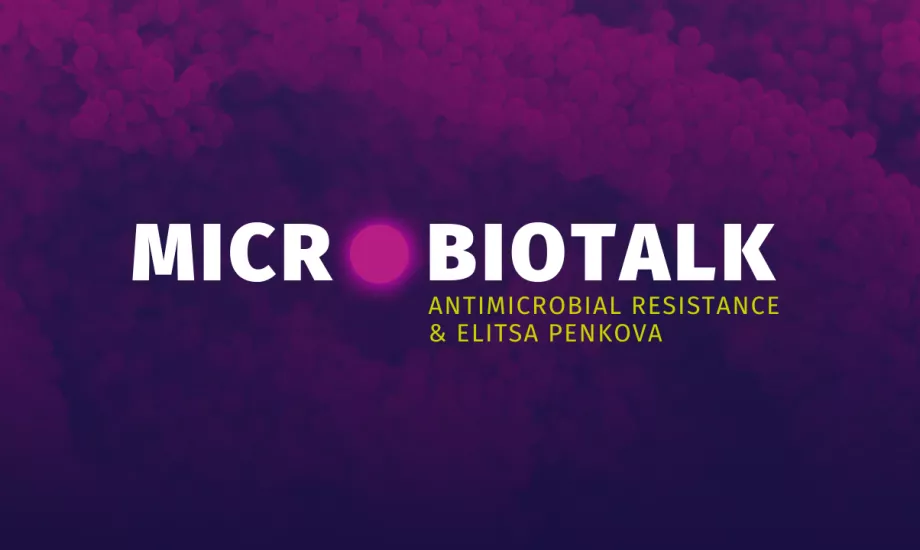
"Antibiotics we take end up in waste, polluting rivers with resistant bacteria, affecting public health, like wild swimmers."
Elitsa Penkova is a PhD student at the University of Exeter, focusing on assessing health risks related to exposure to antimicrobial resistance (AMR) in freshwater environments. Her research specifically investigates how swimmers in rivers might be exposed to antibiotic-resistant bacteria and genes, aiming to understand the potential public health implications of AMR transmission through natural freshwater environments.
Antimicrobial resistance in rivers - a public health risk ?:
Thanks for the introduction and thank you for having me. Now, you might be wondering, what does antimicrobial resistance have to do with rivers? This is a hospital issue, right? But for people like me who study antibiotic resistance, these environments are particularly interesting because they already contain, all the necessary components, for the evolution of resistance, to come together in one place, as some of our speakers already alluded to.
So first, in rivers, we have environmental bacteria, and the majority of these are not considered harmful to public health. Some can be, of course, but the majority are involved in things like nutrient cycling, and they're just a normal part of the environmental ecosystem.
But the reason why they're so interesting is because they carry diverse resistance mechanisms. This is because over a millennium, they have had time to coexist with various types of microorganisms which produce antibiotic molecules. And microbes produce these molecules to communicate with each other or to fight each other off. To be able to coexist alongside these microbes which produce antibiotic molecules, environmental bacteria have had to adapt and evolve various coping strategies or resistance mechanisms.
The real issue here is when these resistance mechanisms become transferable, because unlike humans who can only pass down genes from a parent to our offspring, bacteria can actually share genes between both related and unrelated species.
While it's really fascinating to see how they can literally share a gene from one cell to the other in the previous talk, this is also really terrifying because it means that once a resistance mechanism has emerged and has become transferable, then this has the potential to very quickly spread within and between bacterial populations.
And this is also how bacteria are able to accumulate multiple resistant genes at the same time, which is how we go from a resistant bacteria to what we call a superbug. And here I've included an example of the ability to share genes between environmental bacteria and clinically important pathogens.
The example here is on beta-lactams. Sorry, beta-lactam resistance. Beta-lactams are a class of antibiotics which are most commonly used globally in the resistance mechanism, which bacteria use to overcome the toxicity of these antibiotics, that is beta-lactam resistance. Beta-lactam resistance are enzymes, which bind to the antibiotic and degrade it, essentially. But the genes that are encoding these enzymes are considered to have originally evolved in environmental bacteria and only later transfer to clinically important pathogens.
And this is just to illustrate that while environmental bacteria not necessarily a threat to public health, they can serve as a reservoir for clinically important pathogens, which, incidentally, are also found in rivers. So with our waste, we're continuously enriching rivers in other natural fresh water environments with both human and animal-associated bacteria, but also with various antimicrobial compounds, including antibiotics, of course.
When we take antibiotics, we don't fully metabolize these, and the majority can be excreted directly into our toilets, and from there, drained into our wastewater treatment systems. There are different ways that we process waste, but none of them are designed specifically to remove antibiotic-resistant genes or antimicrobial compounds. So some of these will eventually end up in rivers.
And in addition to this, of course, we hear more often now that wastewater treatment plans are actually permitted to discard untreated or partially treated sewage directly into rivers during heavy rainfalls. This is to prevent themselves from becoming overwhelmed and preventing wastewater backing into people's homes, which is fair enough. But we don't really know what this means for the growing community of wild swimmers, which is what my research focuses on.
And there's actually very little focus on how exposure to antimicrobial resistance in these environments is affecting public health.
We know from previous work in Norway, from a case-control study, that freshwater swimming was identified as an independent risk factor for acquiring resistant infections, resistant urinary tract infections.
We also know from a study in Norway, which estimated that freshwater swimming accounted for about 6% of the acquisition of resistant cases in the community over the summer months.
We know from a study on UK coastal swimmers, so not freshwater swimmers, but coastal swimmers. Surfers were found to be four times more likely to carrying antibiotic resistant bacteria than people who don't go into the water.
And similar to that study, I'm now working to understand whether fresh water swimmers are at high risk of carrying resistant bacteria in their guts. But as I'm still collecting my samples, I'm not able to talk about my findings yet, but I'm happy to take any questions if you have them.
Thank you
3 key messages
-
Rivers as Reservoirs for Antibiotic Resistance: Rivers contain environmental bacteria that have developed diverse resistance mechanisms over millennia. These bacteria can transfer resistance genes to clinically important pathogens, making rivers significant reservoirs for antibiotic resistance.
-
Impact of Wastewater on River Microbiota: Human and animal waste, along with antimicrobial compounds, are continuously introduced into rivers through wastewater. Wastewater treatment plants are not designed to remove antibiotic-resistant genes, leading to the enrichment of rivers with these genes, especially during heavy rainfalls when untreated sewage is discharged.
-
Public Health Risks for Freshwater Swimmers: Exposure to antibiotic-resistant bacteria in rivers poses a public health risk, particularly for freshwater swimmers. Studies have shown that swimming in freshwater can increase the risk of acquiring resistant infections, highlighting the need for more research on the impact of antimicrobial resistance in natural water environments.
Download her presentation

Edith Odeh
Ampiclox and contraception, raise awareness on AMR
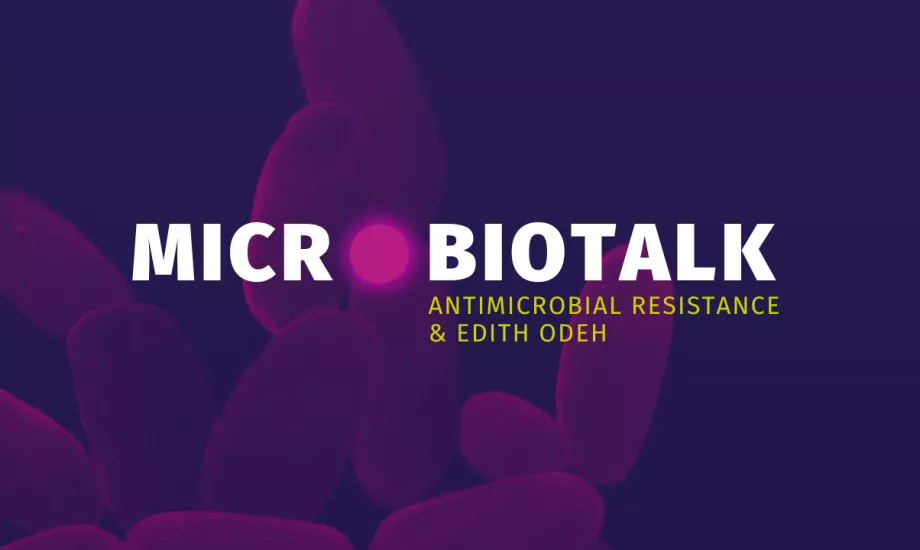
"Raising awareness about reproductive health is key in communities where many women are misinformed. Knowledge empowers and improves society."
Passionate and committed pharmacist in Nigeria.
Founder of Kings Heritage Pharmaceutical Limited, Asaba, Nigeria.
She has opened a health center bringing together pharmacists, doctors and volunteers to provide reliable information on contraceptive methods and alert women to the long-term consequences of antibiotic abuse, such as microbiota dysbiosis and AMR.
This ambition earned her the first Henri Boulard prize in 2021.
I want to start by sharing my early inspiration and motivation. In 2015,early in my career as a community pharmacist, on a fateful day, a father brought in his 13-year-old child who was suffering from severe diarrhea.
So after a thorough review of the patient's medical history, I decided to initiate treatment with probiotic. Within an hour of initiating this treatment, the teen who had arrived carrying a waste bucket was able to leave the pharmacy comfortably wearing just his diaper. This wonderful experience sparked my interest in Biocodex's commitment to evidence-based medicine, inspiring me to develop a grant project which is titled, establishing a reproductive health facility to address safe contraception methods and to dispel the myths surrounding the use of Ampiclox capsule as a female contraceptive in Nigeria.
And you may be wondering, what is the correlation between Saccharomyces and contraception? Having demonstrated such a level of honesty and standard, I was convinced that this institute has a sincere purpose, and if I merit this award, I was going to win.
Now, coming to the scope of my project and the implementation. The project, which focused mainly on reproductive health and safe contraception methods, reached out to seven communities, engaging an average of 20% of the populace in each community. We distributed free contraceptive educational materials and anthelmintics and inspirational books, to provide these communities with accurate reproductive knowledge and rational use of antibiotics. Now, recognizing the cultural sensitivity of the project, we collaborated closely with community heads, religious leaders, and healthcare professionals to pilot our approach.
This led to an impressive turnout of 20% across the communities. Through this project, we succeeded in reducing the number of unwanted pregnancies, improving responsible antibiotic use, and promoting healthcare community practices, leveraging on local partnership. We succeeded in yielding, in getting the result of the project and addressing a specific community need. In a community where you have about 50% of the female population misinformed, and naive about their reproductive health, it was a huge burden.
But as a result of this project, we were able to sensitize them, and they are now better equipped with reproductive knowledge. They have a better control. So these are some of the pictures from the outreach.
King's Heritage Pharma Limited plans to train local representatives in each community who will serve as ongoing educators and champions for reproductive health. We also aim to extend our outreach to more communities and build stronger partnership with healthcare professionals. We also intend to enhance the initiative by collaborating more with local influencers.
Our reproductive health facility, which is strategically located at Agbaroto-Otor, Ughelli, in North Delta State, will serve as a center for support and education. Now, as we continue to expand our outreach and build partnership with healthcare professionals for sustainable impact, we invite all healthcare professionals, community leaders, and educators to join us in advancing reproductive health and rational use of antibiotics.
With your support and collaboration, we can empower more advocates, dispel harmful myths, and provide life-changing resources. Together, we can create a healthier, informed, and a more resilient community.
Thank you.
3 key messages
-
Inspiration and Commitment to Evidence-Based Medicine: Edith's early experience as a community pharmacist, successfully treating a child with severe diarrhea using probiotics, inspired her commitment to evidence-based medicine and led her to develop a grant project focused on reproductive health and safe contraception methods in Nigeria.
-
Community Outreach and Education: The project reached seven communities, engaging 20% of the population in each, and provided educational materials on contraception and antibiotics. By collaborating with community leaders and healthcare professionals, the project successfully reduced unwanted pregnancies and improved responsible antibiotic use.
-
Sustainable Impact and Future Plans: The reproductive health facility in North Delta State built thanks to the grant received will serve as a center for support and education, aiming to build stronger partnerships and empower communities with accurate reproductive health knowledge.
Download her presentation

Greatman Adiela Owhor
The 100 AMR stewards project
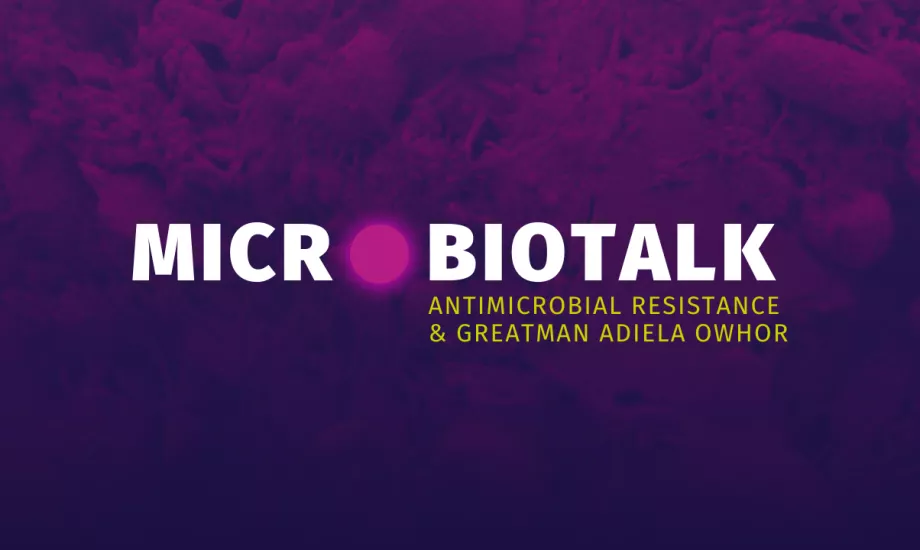
"This project was to empower professionals and caregivers, and implement robust antibiotic stewardship initiatives in healthcare settings."
Greatman Adiela Owhor is a dedicated pharmacist and health content creator with a strong foundation in research, project management, and health promotion. He is an emerging researcher with growing expertise, having already published in respected journals like *The Lancet* and the *International Journal of Health Planning and Management. * His work has earned over 150 citations and an H-index of 3, reflecting his impact in the field.
Greatman's commitment to public health has been widely recognized. In 2021, he received the prestigious Diana Award from the United Kingdom, an honour awarded to young people making significant contributions to their communities. Additionally, he was named "Pharmacist of the Year" in Rivers State in 2020 and "Public Health Promoter of the Year" in 2021. His work was further celebrated with a feature on World Volunteering Day in Nigeria (2020) for his public health contributions.
In 2023, Greatman founded *CommCase*, a groundbreaking platform connecting community pharmacists globally to address challenging cases encountered in practice. CommCase facilitated the resolution of over 1,000 cases within its first year, earning widespread recognition across Africa. For his work with CommCase, Greatman was named Nigeria’s "Top Pharmacy Innovator of 2023" by Mega We Care Pharmaceuticals.
Greatman's efforts to combat antimicrobial resistance (AMR) reached new heights in 2023 when he was awarded the Henri Boulard Public Health Award. With this award, he launched a nationwide AMR awareness campaign that engaged thousands of individuals both online and offline, achieving a 50% increase in awareness in the targeted areas.
With an active following of over 70,000 on X (formerly Twitter), Greatman continues to advocate for public health and AMR stewardship. Looking to the future, he aims to leverage health promotion and technology to significantly impact community health and well-being.
My name is Greatman Adiela, and I am the team leader for 100 AMR Stewards Project. This project was primarily designed to empower 100 individuals to carry out local antimicrobial resistance projects in their region.
This project was possible because of the support from the Biocodex Foundation.
So we started with a four-month online campaign where we reached out, to over 600,000 Nigerians, and we engaged them about issues related to antimicrobial resistance in their region.
We leveraged platforms such as Facebook, TikTok, Instagram, X, and LinkedIn in carrying out this engagement.
This was quickly followed up by scouting for stewards, 100 of them, training them, helping them understand the Antimicrobial resistance and the issues peculiar to their environment, and also supporting them in executing a local project.
Nigeria is divided into six geopolitical zones, so we're careful to ensure that our 100 stewards are spread out across these zones.
We became emotional after two months because the stewards overdelivered on their project. We are pleased to have done projects in abattoirs, markets, schools, and even on the streets.
We ensured that these projects were measurable. Therefore, the stewards had to make some form of assessment to get numbers or figures about the understanding of AMR in their region or about issues related to AMR.
And then after their campaigns or projects, they were also made to reassess the same metrics that were previously assessed to see if there had been an improvement. And we are pleased because some regions experienced more than a 70% increase in their knowledge of antimicrobial resistance.
We are excited about what we've done over the past months, and we are even more excited about doing more in the future.
On behalf of all the stewards and my team, I want to say thank you, to Biocodex Microbiota Foundation, for partially supporting this project and bringing all our dreams to life.
Thank you.
3 key messages
-
Empowerment and Training of AMR Stewards: The 100 AMR Stewards Project aimed to empower 100 individuals across Nigeria's six geopolitical zones to carry out local antimicrobial resistance (AMR) projects. These stewards were trained to understand AMR issues specific to their regions and supported in executing measurable local projects.
-
Extensive Online Engagement: The project began with a four-month online campaign that reached over 600,000 Nigerians through platforms like Facebook, TikTok, Instagram, X, and LinkedIn. This campaign raised awareness about AMR and engaged the public on related issues.
-
Significant Impact and Future Plans: The stewards' projects led to a more than 70% increase in AMR knowledge in some regions. The success of these initiatives has motivated the team to continue expanding their efforts, with plans to train more local representatives and build stronger partnerships for sustainable impact.
BMI-24.60












